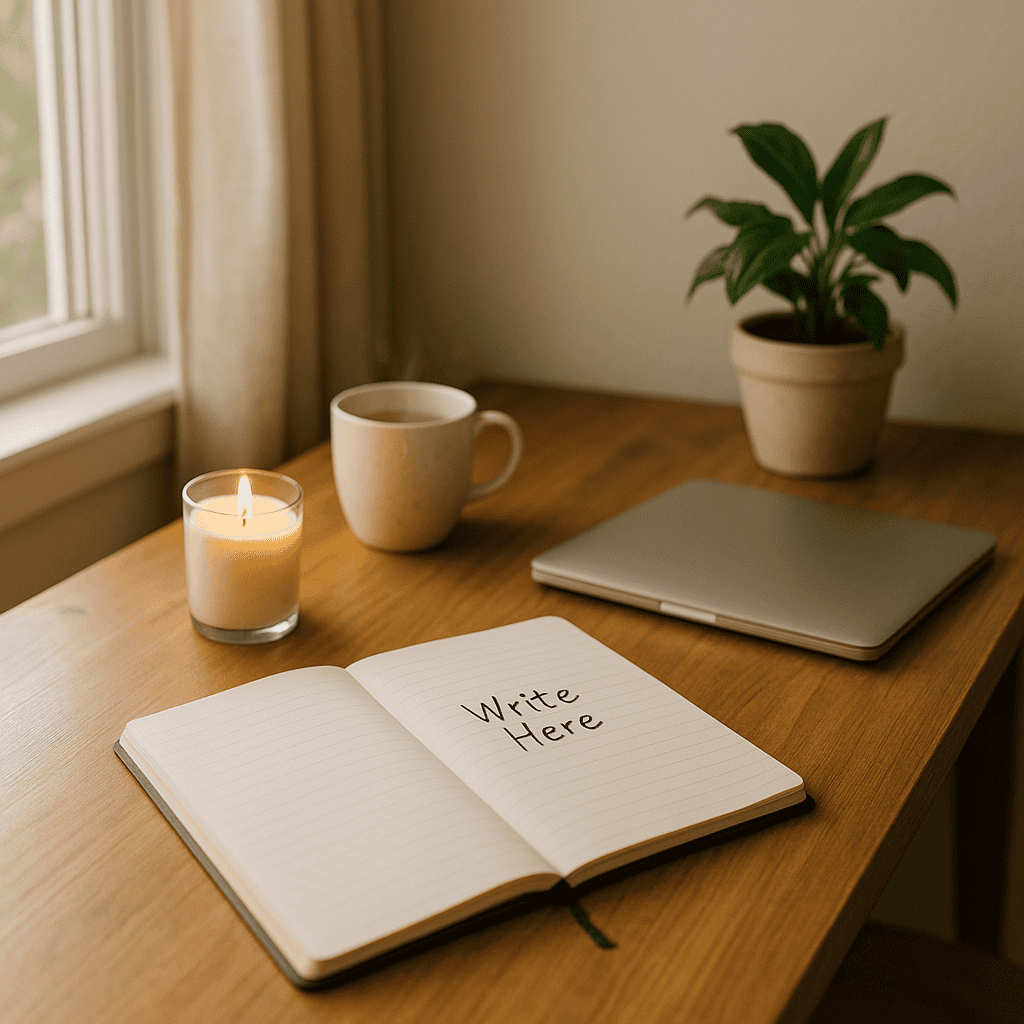Create an Energizing Writing Environment—5 Powerful Hacks
“Environment is the invisible hand that shapes human behavior.” — James Clear, Atomic Habits
Your writing environment is more than a backdrop. It’s a creative tool. The sights, sounds, scents, and even layout of your workspace can either invite your imagination in or push it away. Many writers blame their lack of motivation on themselves: I’m lazy. I’m undisciplined. I’m just not inspired today. But what if the real culprit isn’t your mindset but your writing environment?
The right writing environment won’t magically write your book for you, but it can reduce friction, boost energy, and trigger flow. You don’t need an expensive studio or a mountain-view desk. You need a setup that supports how you write best.
Why the Environment Affects Creativity
Your brain responds constantly to sensory input. Light, noise, clutter, temperature, color. All of it sends signals about whether you should focus, relax, or flee.
If your writing environment is chaotic, overstimulating, or even just bland, it creates cognitive friction. Your attention gets pulled in different directions, and your writing sessions start to feel like uphill battles.
On the other hand, an intentional workspace fosters creative flow. It tells your brain, This is where we focus. This is where we make things. Over time, this space becomes associated with creative momentum.
Elements of an Energizing Writing Environment
1. Light That Lifts You
Natural light boosts mood and alertness, but if that’s not available, use warm, soft lighting to reduce eye strain and increase comfort. Avoid harsh overhead lights. Instead, opt for desk lamps or floor lamps that create a cozy, focused glow.
2. Sound That Supports, Not Distracts
Some writers thrive on silence; others prefer ambient noise or music. The key is to choose sounds that fade into the background and enhance concentration. Try instrumental playlists, white noise, or nature sounds, and always have headphones nearby for consistency.
3. Visual Simplicity
Clutter is more than physical. It’s also mental. Too many items on your desk, walls, or screens can pull your attention away from your words. Keep your writing space visually clean. Add 1–2 meaningful or inspiring objects (like a favorite quote or plant), and tuck everything else away.
4. Temperature & Comfort Matter
Your body influences your brain. If you’re too cold, stiff, or uncomfortable, focus breaks down. A good chair, soft layers, and the right temperature can help maintain your physical well-being, preventing it from sabotaging your mental state.
5. Scent as a Creative Trigger
Scent has a powerful effect on memory and mood. Try lighting a specific candle or using essential oils only when you write. Over time, this creates a strong association between the scent and the act of writing.
Quick Win: Energize Your Desk in 10 Minutes
Want to boost your writing energy fast? Try this:
- Clear your desk of all but 3 essentials: writing tools, water/tea, and your project
- Wipe down the surface (freshness cues the brain)
- Add 1 object that inspires you: a candle, a plant, a quote
- Adjust the lighting to something soft but focused
- Play ambient music or silence, whichever supports your mood
This mini-reset works wonders for attention and morale.
“Your surroundings can either distract or direct your creative energy.”— Cal Newport, Deep Work
Final Thoughts: Set the Stage for Creative Success
Your environment speaks to your brain before you do. When you create a space that aligns with how you want to feel (calm, focused, inspired), you make it easier to return to the page, day after day. You are the architect of your writing environment, and your choices can significantly impact your writing experience.
You don’t need a perfect space. You need a purposeful one. Design it once. Let it support you always. You don’t need the perfect writing room. You only need one that helps you focus and feel good. For instance, you could add a favorite quote on the wall, a plant on your desk, or a scented candle. Try one small change today and watch how your energy shifts.
Print the Energizing Writing Environment Checklist (below), and explore more new indie author strategies in the rest of our Writing Focus & Habits series on our website. If you’d like more strategies all in one place, read Beat Burnout: Powerful Habits for Focus, Consistency, and Indie Author Success (available in paperback and eBook).
We hope you found these writer’s guide strategies helpful and inspiring. They’re intended to provide you with the necessary tools and insights to succeed as an indie author.
For more guidance on Focus and Habits, see other guides in this series. We suggest starting with Boosting Mental Focus—5 Hacks for New Indie Authors. You might also like Outcome-Based Management: 7 Steps to Writing Success.
If you have a draft and want to explore how AI can help you self-publish it, read, Is Your Book Ready to Self-Publish? Lastly, for help writing a non-fiction book, read Write Your First Non-Fiction eBook: a 30-Day Workbook for Getting It Done.
Writing is an ongoing adventure that involves continuous learning and improvement. You don’t have to go through this alone. We are excited to accompany you every step of the way, providing you with the support and motivation you need. Our goal is to give you the necessary knowledge and practical advice to navigate the world of writing with confidence.
Don’t wait. Start today! How can we help? To let us know, please fill out our Contact form. Happy writing!
Energizing Writing Environment Checklist
By following this checklist, you can create a writing setup that helps you feel more focused, inspired, and productive, all without major changes. It’s a practical way to optimize your writing environment and enhance your writing experience.
☐ Open blinds or turn on a warm desk lamp
☐ Remove 3 unnecessary items from your workspace
☐ Add 1 object that inspires you (quote, candle, plant, etc.)
☐ Adjust your chair or seating for better posture and comfort
☐ Test ambient sound or music that supports focus
☐ Use a scent (candle, oil, or incense) tied only to writing time
☐ Take a short break to reset your space before your next session
☐ Snap a photo of your energized space as your visual writing cue
“A writer’s room is never just a room. It’s a mind space made physical.”— Julia Cameron, The Artist’s Way
#


